On May 27, the International Symposium on Learning Sciences and Artificial Intelligence (AI) Education took place in the Conference Hall of the Convention Center at the Southern University of Science and Technology (SUSTech).
The symposium, themed “Learning Sciences and AI Education”, featured prominent speakers, including Yurong GUO, former University Council Chairperson of SUSTech and Professor at the Center for Future Education Research, Ling ZHANG, University Council Vice-Chairperson, and Yuehong CHEN, Chair Professor and Dean of the School of Humanities and Social Sciences.
In the opening remarks of the symposium, Yuehong CHEN pointed out that since the release of ChatGPT on November 30, 2022, global production, life, culture, and economic systems have rapidly changed, with the education field being the first to bear the impact. As educators, we must recognize that AI is revolutionizing the traditional educational ecosystem and the layout of subject systems.
He shared his paper “Transformation and Innovation: The Iterative Development of AI and the Future of Humanities”, published in the “People’s Forum Academic Front” headline of the People’s Daily, which discusses the historical and social changes brought by the breakthrough application of AI and the innovative changes in humanistic research methods.
Professor CHEN noted that future education cannot be separated from academic research and practice in the fields of learning sciences and AI education. The Center for Future Education Research at SUSTech closely follows this trend, promoting the application and development of AI in education. He called on educators to focus on the present, look to the future, and jointly explore the profound impact of AI on education.
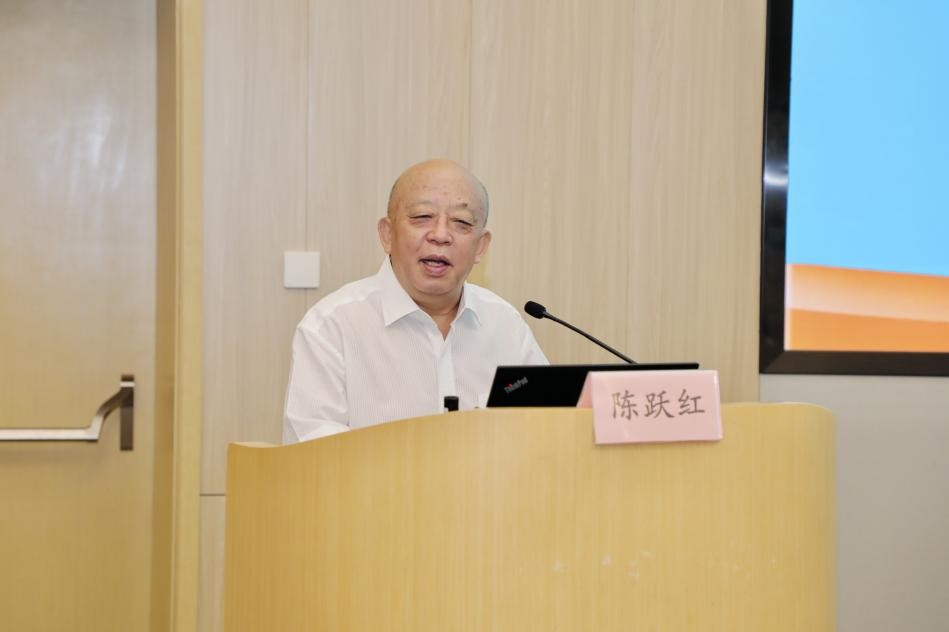
Professor Yuehong Chen delivering his opening speech
On behalf of SUSTech, Vice-Chairperson Ling ZHANG warmly welcomed the attending leaders, guests, and scholars. In his remarks, he stated that learning sciences explore how humans learn, and AI can provide personalized learning, intelligent tutoring, and automated assessment.
He noted how the application of AI in education is not just a technological innovation but a profound transformation of educational concepts and models. By processing and analyzing educational big data, AI offers new research methods and perspectives for learning sciences.
Vice-Chairperson Ling ZHANG referenced how SUSTech has established the Future Education Center, hosting key research bases in Shenzhen and Guangdong Province focusing on AI education, highlighting the University’s emphasis on cutting-edge and experimental education and its close attention to future educational development trends. He hoped the guests would gain inspiration and insights from the academic research and achievements shared by experts, collectively envisioning a bright future for education.
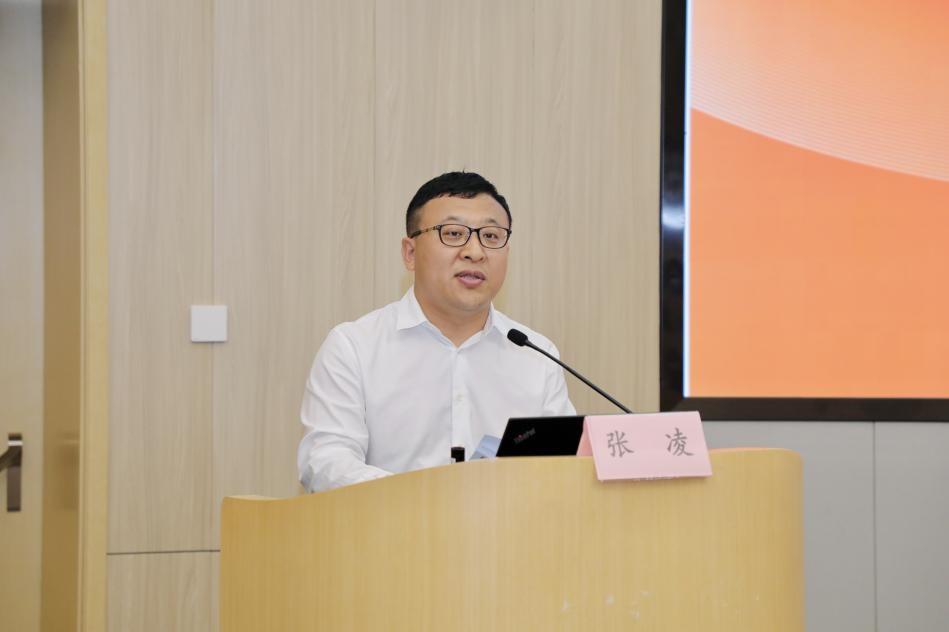
Vice-Chairperson Ling ZHANG speaking at the symposium
In her address, former University Council Chairperson Yurong GUO emphasized the significant importance of this symposium, marking a new stage in the Center for Future Education Research at SUSTech in the field of learning sciences and AI education.
She noted that this symposium provides a platform for communication and exchange on learning sciences and AI education, and looks forward to the collision of ideas that will promote the application of AI in education.
Furthermore, she encouraged participants to gain new research insights from the exchanges and to continuously achieve new results in their practical work, urging everyone to work together in the AI era to contribute to the development of the intelligent age.
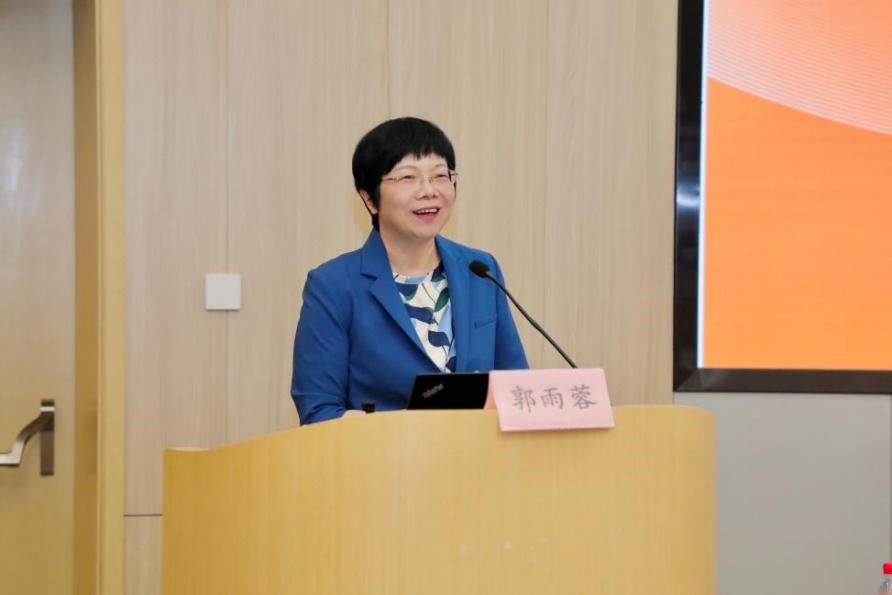
Yurong GUO delivering her remarks at the event
During the symposium, the Center for Future Education Research held an unveiling ceremony for two newly established key research bases: the “SUSTech Artificial Intelligence Education Research Center” under the Shenzhen Humanities and Social Sciences Key Research Base, and the “SUSTech New Generation Artificial Intelligence Education Research Center” under the Guangdong Federation of Social Sciences Consultation and Decision-Making Research Base.
The milestone event was witnessed by Yurong GUO, Ling ZHANG, and Yuehong CHEN, along with Jianhua ZHAO, Professor and Deputy Director of the Future Education Research Center at SUSTech, Jim Slotta, Professor of the Department of Curriculum, Teaching and Learning at the University of Toronto, and Yun DAI, Assistant Professor at the Chinese University of Hong Kong, among others.
The unveiling ceremony marks an important achievement in the field of AI education research for the Center for Future Education Research at SUSTech, laying a solid foundation for future research endeavors.
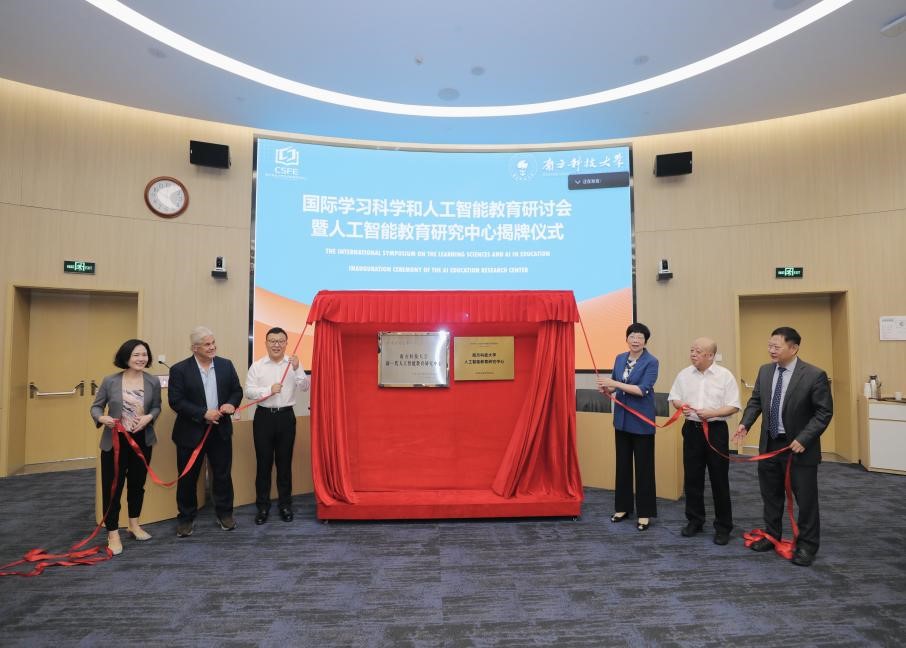
Unveiling ceremony of the “SUSTech Artificial Intelligence Education Research Center” and “SUSTech Next Generation Artificial Intelligence Education Research Center”
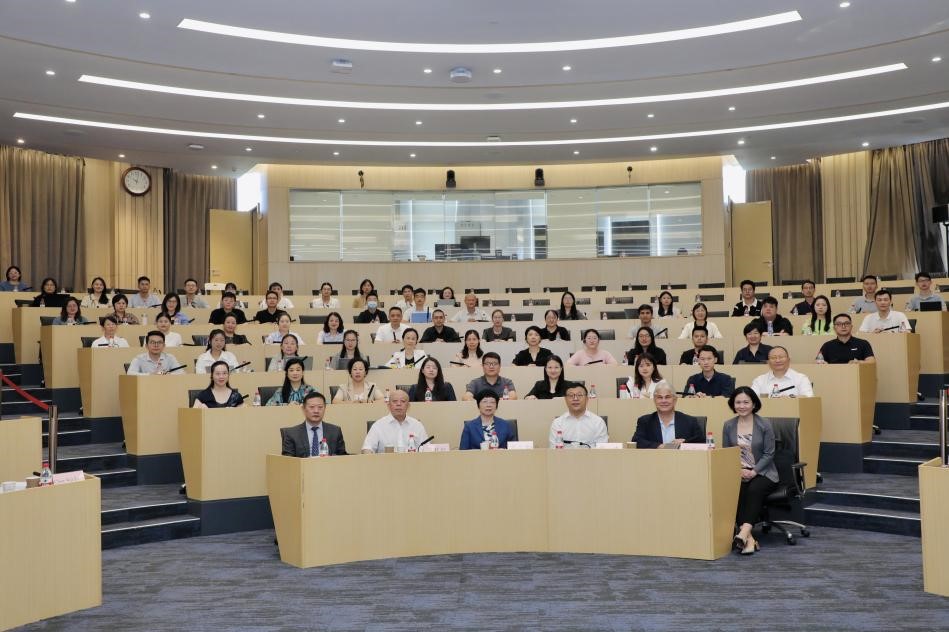
Group photo of all participants
In the keynote session, Professor Jim Slotta delivered a report titled “The Potential of AI for Transforming Education: Smart Classrooms and Learning Communities”.
He emphasized that 21st-century education needs to cultivate students’ critical thinking, design ability, creativity, collaboration, and problem-solving skills to address complex social issues such as climate change, public health, and global interdependence. Through STEAM (Science, Technology, Engineering, Arts, and Mathematics) projects, students’ learning interests can be stimulated, helping them understand the true meaning of learning, not just for exams.
Professor Slotta showcased research cases of smart classrooms, such as EvoRoom and Wallcology, where immersive simulation environments and embedded phenomena studies help students learn complex scientific concepts collaboratively and interactively. The application of AI in education is not only a technological innovation but a profound transformation of educational ideas and models. Through script and orchestration environments (SCORE), better design and execution of collective inquiry activities can be achieved, realizing personalized and real-time feedback.
He called for the importance of humanized education roles in the AI era, emphasizing the design of learning communities that connect students with peers and teachers, making learning interesting and meaningful, thereby promoting the continuous development of education.
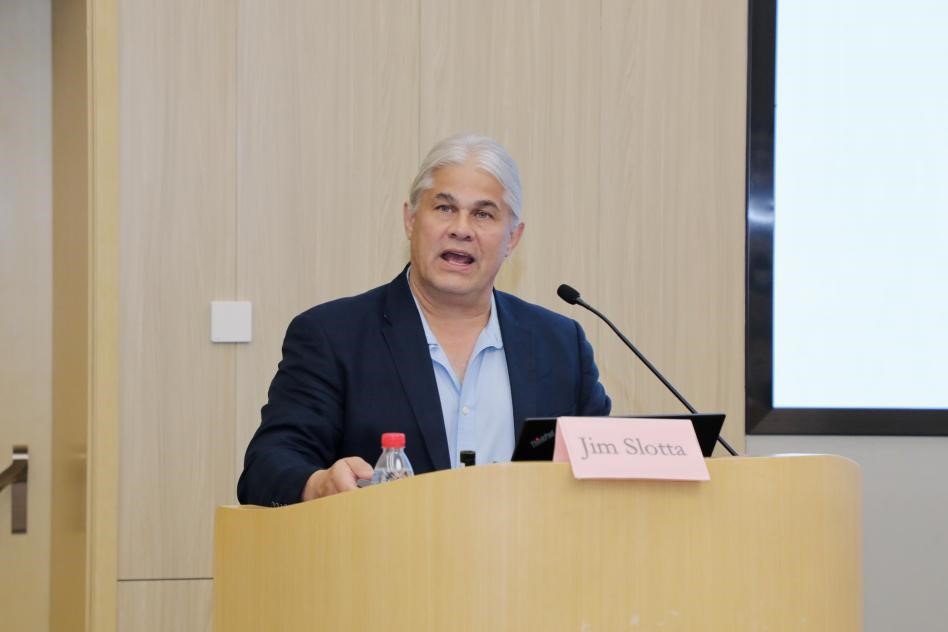
Professor Jim Slotta speaking about the potential of AI for transforming education
Hu XIAO, Associate Professor at the University of Hong Kong (HKU), delivered a keynote report titled “Learning Analytics for Student-AI Interactions: Current Work and Future Possibilities”.
She introduced the idea that learning analytics use a closed-loop model to analyze data generated by students, forming decisions and interventions to improve learning outcomes. She presented research cases in K12 education and higher education, including AI courses for kindergarten and generative AI maker activities at the university level. The application of AI in K12 education is feasible and inclusive.
In higher education, generative AI is mainly used in virtual reality creation and writing activities to help students solve real-world problems and improve learning outcomes. Learning analytics can optimize student-AI interactions by providing personalized and automated feedback through log analysis and multimodal data, assisting students to use AI tools more effectively. Practical actions should adopt more interdisciplinary collaboration and encourage community participation to better promote educational development and practice improvement.
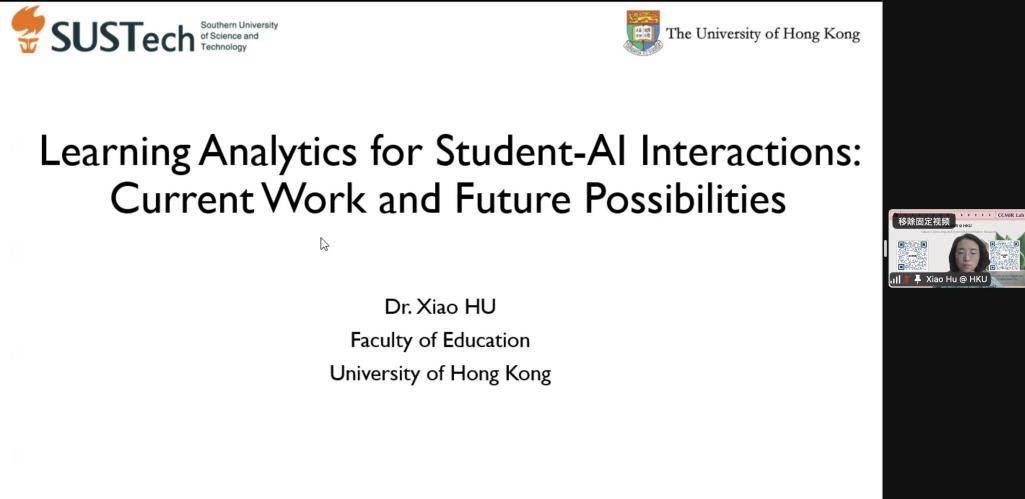
Professor Xiao HU’s keynote report
Professor Yun DAI delivered a keynote report titled “A Tale of Two Intelligences: Promoting AI Literacy in Upper-Primary Education”.
AI literacy is a fundamental ability for modern students. Through years of research and practice, she has developed AI education courses suitable for children aged 9-12, which are not only interesting and easy to understand, but also integrate with existing STEM courses. She proposed an “analogy and contrast teaching method”, helping students understand AI’s working principles and limitations by comparing human intelligence and AI.
Professor DAI shared several teaching cases, such as using the “I Draw, You Guess” game to help students understand the machine learning process and demonstrating teaching examples combining generative AI with mathematical thinking. Her research shows that this teaching method significantly improves students’ AI knowledge, skills, and ethical awareness, reducing their anxiety about AI.
She also introduced her collaboration with schools in Shenzhen and Beijing, organizing AI summer camps and using community service to improve AI literacy among low-income family students. She hopes these efforts will help students better understand and apply AI, cultivate critical thinking and ethical awareness, and prepare them for the future AI world.
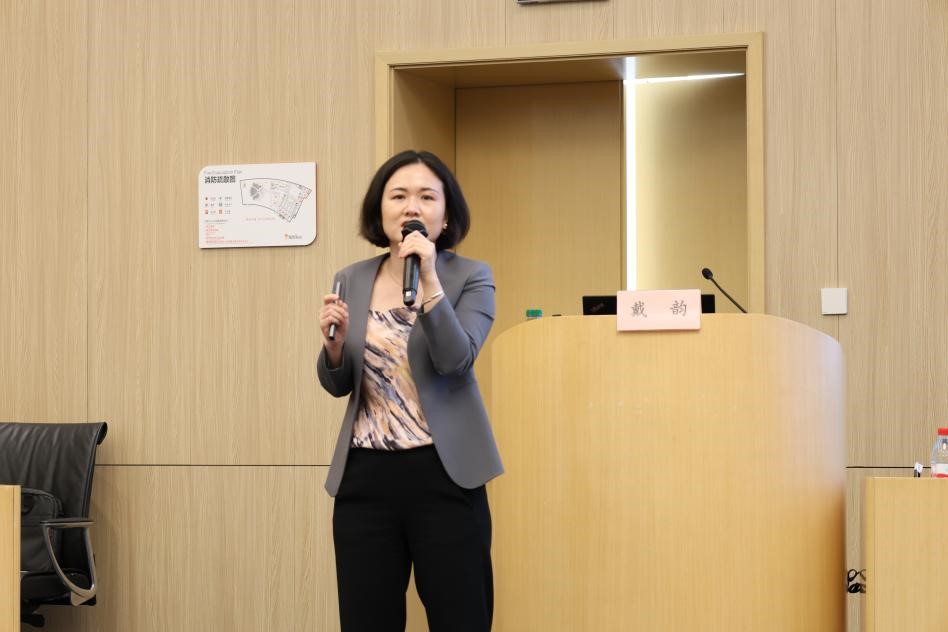
Keynote report being presented by Professor Yun DAI
Professor Chee Kit Looi from the National Institute of Education at Nanyang Technological University and the Education University of Hong Kong delivered a keynote report titled “Generative AI for Personalized Learning: Myth, Reality, or Promise?”
He explored the role and potential of generative AI in education, especially in personalized learning. While generative AI has the potential for personalized learning, the current expectations in the education field are too high. Personalized learning requires not only technical support, but also teacher guidance and intervention to maximize learning outcomes. Personalized learning has different levels, from basic responses and customized answers to more advanced memory and diagnostic capabilities. By interacting with generative AI tools, we can explore how generative AI can play a role in personalized learning.
Professor Looi showcased examples of applying generative AI in educational reform, demonstrating how students can gain a deeper understanding of different aspects of educational reform through dialogue with AI. Although generative AI shows great potential in personalized learning, issues like accuracy and memory need to be addressed, and future technological advancements may further optimize these tools in education.
He called for continued deepening of AI education research to explore how to effectively use generative AI to promote educational development.
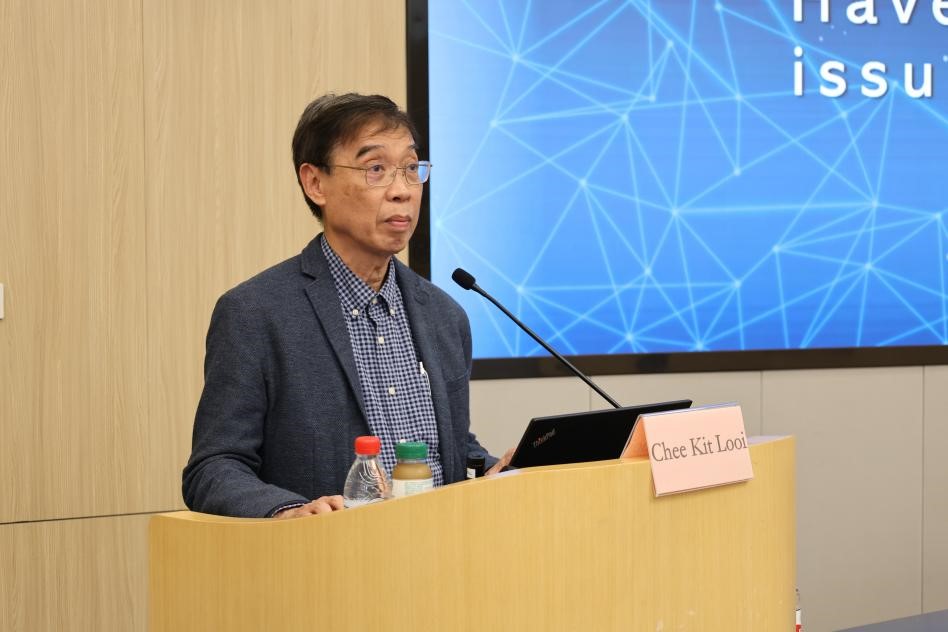
Professor Chee Kit Looi presenting his report at the symposium
Professor Jan van Aalst, former Associate Dean of the Faculty of Education at HKU, delivered a keynote report titled “Knowledge Building and the Learning Sciences”.
The history of learning sciences dates back to the 1980s, originating from cognitive science and gradually applied to classroom teaching. Learning sciences emphasize inquiry, collaboration, solving real-world problems, and metacognition. In recent years, educational neuroscience and big data analysis have become new research trends, providing deeper learning process analysis and result evaluation methods for learning sciences. Social equity and justice issues have also become focal points in learning sciences.
In showcasing knowledge-building research, he shared the core principles of knowledge-building, including solving real problems, improving ideas, and diverse perspectives, going beyond existing knowledge, and democratizing knowledge. These principles provide a foundation for educational design. Knowledge building is not only the transmission of knowledge but also the solving of unsolved problems through community collaboration. In the knowledge-building process, students learn not only existing knowledge but also explore and construct new knowledge.
Professor Aalst shared knowledge-building research cases, suggesting interdisciplinary methods to promote students’ knowledge construction and communication. Knowledge building should go beyond traditional classrooms, create interactive communities, and use computing tools to enhance students’ learning experiences, inspiring students to contribute to current social and global issues.
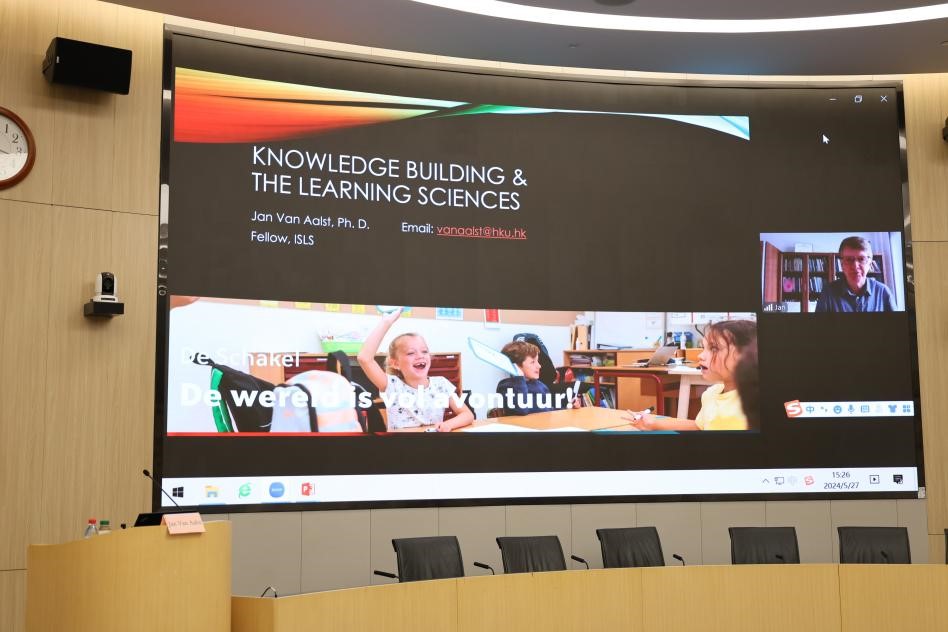
Keynote report by Professor Jan van Aalst
Professor Carol CHAN from HKU’s Faculty of Education also delivered a keynote report titled “Generative AI for Promoting Student Agency and Knowledge Building”.
Although AI has advantages in data processing and pattern recognition, it lacks autonomy, metacognition, and emotional understanding, making it unable to completely replace human educational roles. Professor CHAN used the Interactive-Constructive-Active-Passive (ICAP) model and self-regulated learning framework to show how AI can promote students’ deep learning and inquiry ability development.
In the learning process, students should not only interact with AI but also actively construct knowledge through dialogue and collaboration, improving learning outcomes. In the knowledge-building process, students should act like scientists, discovering problems, posing questions, making explanations, and conducting collective discussions to enhance overall cognitive levels. For the knowledge-building model and related teaching practices, teachers play a key role. Regarding the arrival of the AI era,
Professor CHAN believes there is no need to worry about AI’s impact on education but should actively embrace AI. AI can provide more convenience for teachers, making teacher-student interaction, data analysis, and outcome presentation more intelligent in knowledge building. Therefore, education should start from real problems, design effective teaching plans, and use AI to promote educational transformation. By promoting human-machine collaboration, educators can help students develop critical thinking, problem-solving skills, and other key abilities needed in the 21st century to cope with the complex and changing world of the future.
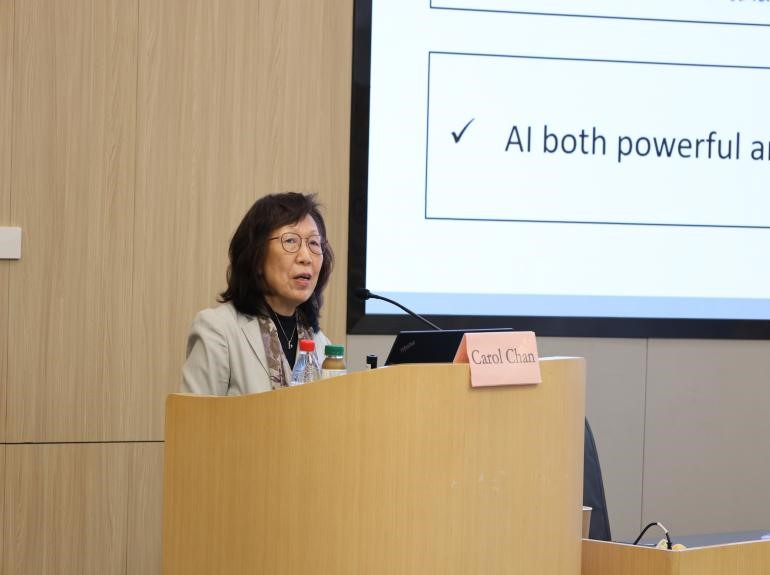
Professor Carol CHAN speaking about how AI can promote student agency and knowledge building
Professor Jianhua ZHAO delivered a keynote report titled “Information Science and Technology Education in the Age of Artificial Intelligence: Opportunities and Challenges”.
After demonstrating the powerful functions of the Sora video generation model, he explained its impact and transformation on the education field. Due to the rapid development of AI, the education system needs to make corresponding adjustments to cultivate innovative talents suited for the intelligent era.
In the “Information Technology” course, it is essential not only to focus on knowledge transmission to students but also on cultivating and developing their abilities, including information literacy, computational thinking, digital learning, and innovation. In the AI era, the “Information Technology” curriculum standards must be redesigned from six logical modules: data, algorithms, networks, information processing, information security, and AI.
By building international dialogue and exchange platforms, strengthening discipline system construction, and utilizing interdisciplinary and project-based learning, students’ practical operation capabilities can be enhanced. For ethical issues in AI literacy education, educators need to improve their practical ability to conduct AI education and guide students to use AI technology reasonably, legally, and safely.
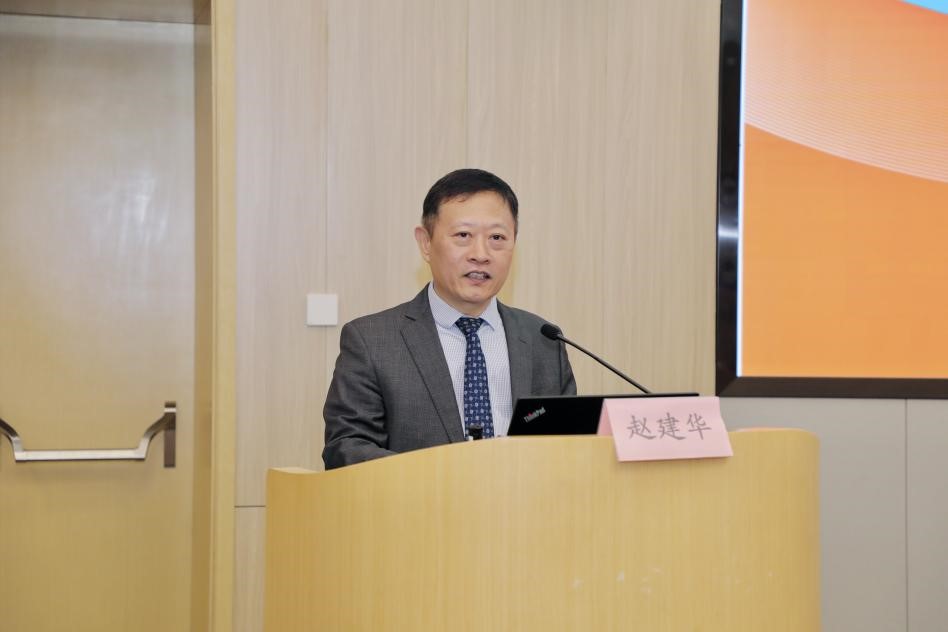
Keynote report by Professor Jianhua ZHAO
This symposium explored the core topics, existing challenges, and future development directions in the fields of learning sciences and AI education. Participants reached a consensus on the current state of AI education: learning sciences will provide a theoretical framework and effective guidance for exploring its development and practice. The close combination of learning sciences and AI education can help investigate how learning occurs under AI conditions, how to effectively enhance student learning and development, and what impact AI education has on students.
AI will integrate with knowledge-building research in learning sciences, providing broader horizons and deeper possibilities for learning sciences research. This symposium served as a valuable exchange platform for in-depth exploration of learning sciences and AI education, fostering deep exchanges and cooperation among scholars. It also provided an opportunity to adopt sharper research perspectives, more scientific methodologies, and closer research partnerships. This approach aims to continuously enhance the visibility and influence of research in the fields of learning sciences and AI education, better realizing the educational transformation and educational changes brought about by AI.
Proofread ByAdrian Cremin, Yingying XIA
Photo By